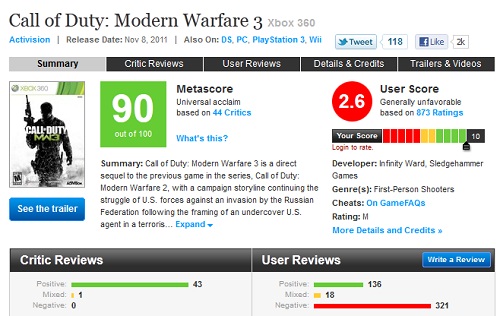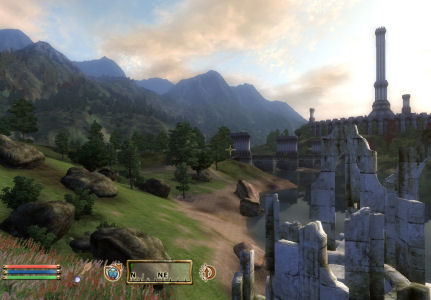Part 1 Here. Please read it, for my sake.
This lead into my next point: the world is free to explore…perhaps a bit too much so. For example, as soon as the intro sequence is done, BAM. Where do I go? What do I do? No, Oblivion feels fit to throw you into its world and then not explain what’s going on. A red arrow on the compass leads to your next destination. That’s fine and dandy, but when it takes me a while to get there (an hour, maybe?) I don’t see the fun in it. Sure, I can use the map to teleport there, and there we have defeated the purpose of exploration. Sure, you might be able to find a new item after a long search, but why bother when the actually exploring is SO DULL? And it really is, and those items just are not worth the trouble. What does exploring amount to? Whack Enemy A, Whack Enemy B, etc… There’s never a pervading sense of danger to the realm or anything, like the world is going to end; take your time, life is apparently very long, or time doesn’t exist, in Tamriel. In addition, the whole leveling up thing has been thrown out the window in favor of dynamic enemies – which in turn promotes this feeling of no progress at all. It doesn’t matter what kind of enemy you face, as they will always be as powerful as you (hence the “very easy” choice I assigned to the game).
See above. Wonderful to look at, certainly, but there’s not that much variety and stuff in that beautiful world. Open worlds demand interesting worlds. Grand Theft Auto does this well because a city, inherently, makes for an interesting dynamic structure for a game. A fantasy medieval world? Not quite as much! Oblivion randomly generates much of its terrain (except for the notable “story” spots), and this makes the ‘cave” or “building” you found a mere assemblage of parts. Random generation works in a roguelike due to constraints, not with freedom.
So, to recap: Whack enemy, whack next enemy, get item, talk to person, etc… Except this game isn’t roleplaying; it’s your common life with swords and magic. Which is to say, not so exciting. The combat is just like a clunky FPS game, and this permeates the entire experience, really detracting from everything else. This is the perfect example of graphics over gameplay. Advertised as an RPG, it’s really for people who like to kill things in a big world in a leisurely way. 10 hours in, I just couldn’t stand the non direction (and the aformentioned whacking of things) and went and played Metal Slug. That should tell you enough. If you like grinding, I guess, go ahead and dive into this one. If you want something more like a pure RPG or pure FPS game, look elsewhere; Oblivion is not the answer.
Such an apt description, honestly. There’s nothing that exciting happening in Oblivion, and I feel quite the same even now. Even the grinding is made null and void due to the enemy “level up” mechanic. Why is this in here?
It not neccesarily that I don’t like to explore a big open world; it’s the fact it isn’t worth exploring. Sadly, this is the case of Oblivion – a game with lots of promise, but a dissapointin experience unless you like to whack things with a big weapon.
Though I stand by that “review”, some aspects do make me cringe. Perhaps, if anything, my high school self could not perceive of the intentions behind a game’s development. Oblivion (and, I would say, every Elder Scrolls game) does not exist primarily to give the player a linear, combat focused experience. Rather, the combat exists as a vehicle for immersion in the world which the developers create. Do I enjoy this particular style any more than I did six (or is it seven?) years ago? Not at all! In fact, Skyrim and the newer Fallout games do not appeal to me in any way, shape, or form. Yet, because of my wider point of view, I at least learned to appreciate the differences among games and their various aspects.
I would call myself a “hardliner” when it comes to the essential characteristics of video games; take a cursory look at the articles on Theology Gaming and that much becomes obvious. However, a great deal of works goes into every game-type, from design to graphics to sound to story (maybe!) and the mechanical underpinnings, both in terms of game rules and programming. I find that the traditional review method, if completely wrong-headed as an absolute voice, presents games as a holistic entity; hence, why coverage usually divided the game’s elements in such strict categories.
So yes, I just defended the traditional reviewer as a necessary component of the industry.

Of course, more and more reviewers abandoned that model in favor of the “personal opinion” which does not HELP me if I do not know you, the person reviewing said game. Me? I’m sure you know what I think. When I read some random review, however, and cannot begin to know that person’s taste, it is a little irksome to read it. They might complain about something totally viable for the genre in question, or even lament an element that the designers put there intentionally, all things considered.
Perhaps what the modern reviewing enterprise misses is, in fact, a fusion of these two styles. Give me your opinion, but also make it apparent what kind of games accord with your tastes. If a game out of your depth surprised you, good! I want that kind of information added onto the bullet list. Tell me about the game and your opinion, but make it informative and not a vague good/bad. You’re allowed to have an opinion, sure, but the point of the review is not to get on your soapbox; it is to speak to an audience willing to learn about a game and your opinion on it. Maybe game culture became too isolated and that would explain the seeming “self-indulgence” of many reviewers in our current times. Too many kinds of reviewers, somehow, lament that the Other exists, when they need to see the good in each other’s ideas.
Now accept the one who is weak in faith, but not for the purpose of passing judgment on his opinions. 2 One person has faith that he may eat all things, but he who is weak eats vegetables only. 3 The one who eats is not toregard with contempt the one who does not eat, and the one who does not eat is not to judge the one who eats, for God has accepted him. 4 Who are you to judge the servant of another? To his own master he stands or falls; and he will stand, for the Lord is able to make him stand.
5 One person regards one day above another, another regards every day alike. Each person must be fully convinced in his own mind. 6 He who observes the day, observes it for the Lord, and he who eats, does so for the Lord, for hegives thanks to God; and he who eats not, for the Lord he does not eat, and gives thanks to God. 7 For not one of uslives for himself, and not one dies for himself; 8 for if we live, we live for the Lord, or if we die, we die for the Lord; therefore whether we live or die, we are the Lord’s. 9 For to this end Christ died and lived again, that He might be Lord both of the dead and of the living.
Romans 14

